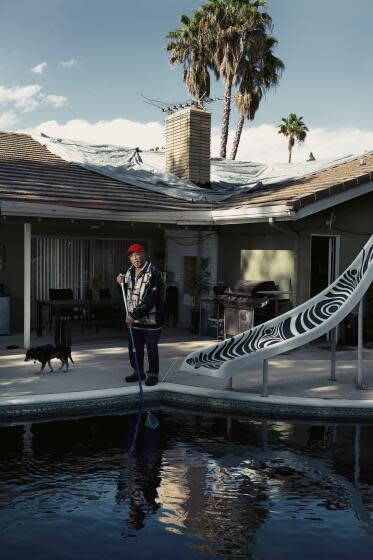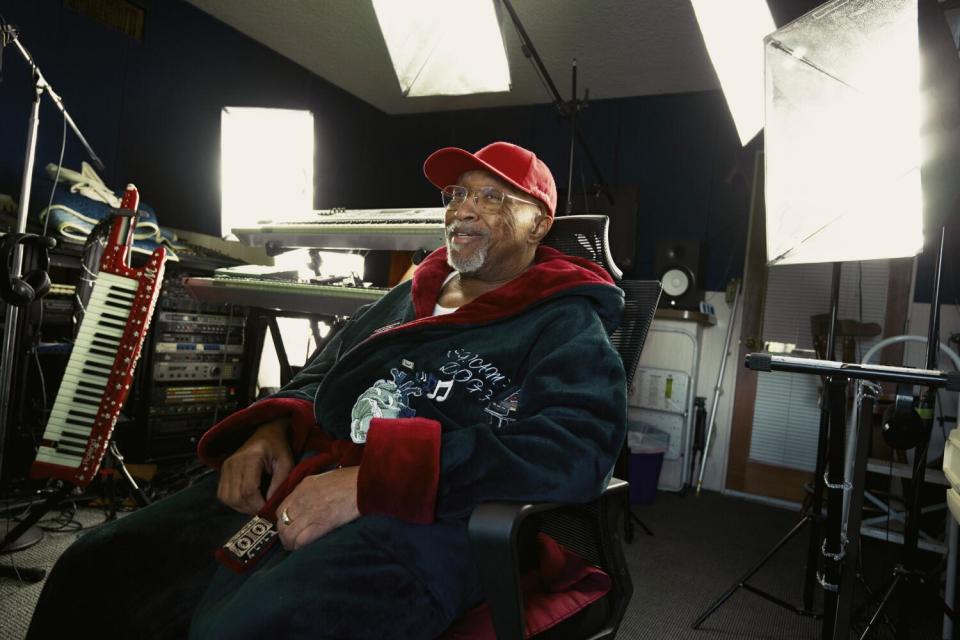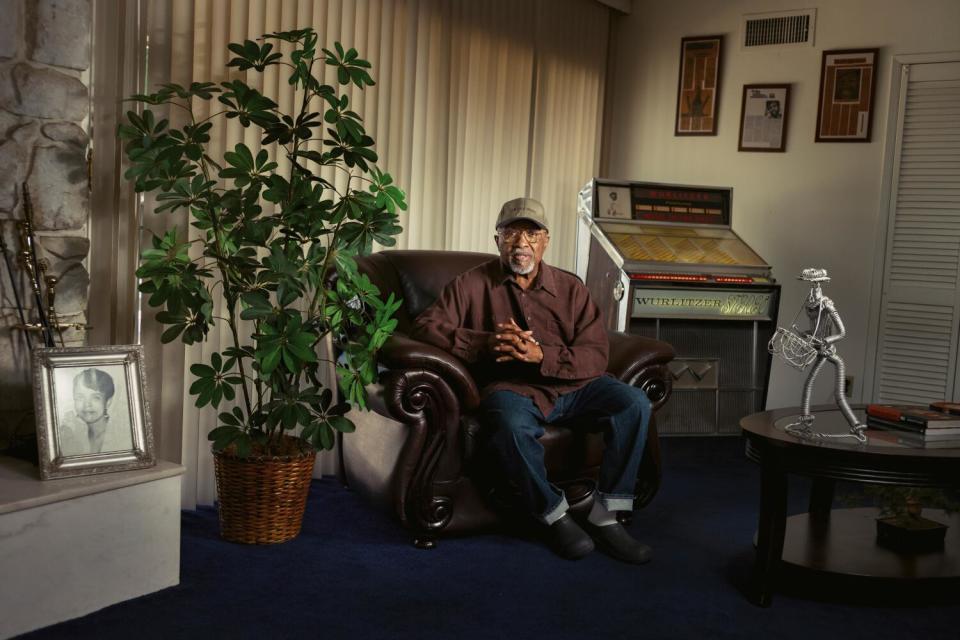How R&B legend Swamp Dogg redefines bluegrass with sexy, soulful wisdom on 'Blackgrass'

Jerry Williams Jr. has a simple reason for deciding to record a bluegrass album: He doesn't know how much more time he has left to do it. At 81 years old, the cult R&B singer, songwriter and producer, best known for his sleazy, wisecracking alter ego Swamp Dogg, can't take anything for granted.
"I figured at my age, I don't have that much longer to be running around here on Earth, no way," Williams says over a Zoom call from his home in Porter Ranch. He leans back in his office chair, hands folded in his lap and baseball hat cocked high on his head. The blinds are drawn behind him to block out the afternoon light.
So, Williams says, "I'm gonna really go where I feel."
"Blackgrass: From West Virginia to 125th St," Williams' 26th studio album as Swamp Dogg, continues a renaissance that began in 2018 when he teamed up with producer Ryan Olson for the acclaimed "Love, Loss, and Auto-Tune." Gone are the vocal effects so cheekily displayed on that and his last album, "I Need a Job…So I Can Buy More Auto-Tune," replaced here with banjo, fiddle and a more raw, earthy brand of storytelling.
There's the trademark sex and humor that Swamp Dogg is known for on album openers "Mess Under That Dress" and "Ugly Man's Wife" and guest spots from Margo Price, Jenny Lewis and Vernon Reid, plus some of today's finest bluegrass pickers, including Chris Scruggs and Sierra Hull. There's even the odd love song, in which Williams' grizzled voice shades in the heartbreak with wearied affection.
"I wanted to depart from where I'm usually at musically and to make an album for me," Williams insists, with his slow, sticky drawl. He points to 1970's psychedelic funk classic "Total Destruction to Your Mind," his first as Swamp Dogg, as the only one "made for me, by me" until now. "That's what I had in mind," he says. "As I was doing this, I said, 'Well, don't nobody like it, don't nobody like it.' But it was time."
That excitement was palpable from the earliest demos, according to collaborator, band member and roommate Larry "Moogstar" Clemon. "I was just amazed," says Clemon, who's lived and worked with Williams for over 15 years. "It was like, wow, he's really fired up. This is something you've been waiting for. You made it. You did it now."
Williams has long dreamed of making an album like this one. Ever since he was a kid in Portsmouth, Va., in the 1940s, he was infatuated with country and bluegrass, which he often heard played on Norfolk radio station WLOW by DJ Sheriff Tex Davis or on the records his grandfather brought home. The first song he learned to play was Red Foley's version of "Peace in the Valley."

"I just loved it. I loved the music, I loved the tempos of the mandolin and ... I loved the fiddles, too," Williams says. "To me, it was just great music. And it was mixed with the rhythm and blues. Between hearing the rhythm and blues and the bluegrass, I always wanted to put 'em together."
The new album does that with the help of Williams' extensive back catalog — reputedly 2,000 songs that he's written, recorded or produced — including reinterpretations of songs he originally wrote for artists like the Commodores and the Drifters. There are also covers of songs he loved in childhood, like "I Gotta Have My Baby Back" by Floyd Tillman or "Have a Good Time," a pop hit for Tony Bennett in 1952.
"If it was a hit one time, I don't care how long ago, it can be a hit again," Williams believes.
Williams has had hits in the country sphere before, though he never received the credit he was due. Most notably, he co-wrote "She's All I Got," which reached No. 2 on the country charts with Johnny Paycheck in 1972. But as a Black artist, he was caught between two worlds: When he attended that year's Country Music Assn. Awards in Nashville, he was initially mistaken for a member of the kitchen staff.
Margo Price, who duets with Williams on the "Blackgrass" cut "To the Other Woman," which he originally wrote for Doris Duke, was a devoted fan well before she knew of his country background.
"He's always thinking about music, always reinventing himself, and just super funny and down to earth. And he's got great stories," she says. "Just hearing what he went through as an artist, as a Black artist especially, trying to break into the country music world and his experience at the CMAs — he's been through a lot, and he's just really an unsung hero."
Read more: Asha Puthli was nearly India’s first disco star. She’s now 79, and her tour’s selling out
Still, Williams says, country was at the root of many of the songs he wrote over the years, even when they bore the appearance of R&B or soul.
"I was really leaning on country when I wrote 'em. It's just that once I put all those horns and [other touches] on there, it kicked country back into the corner — which is what I wanted to do," Williams says. "I liked the country feel, but I knew Black radio wasn't gonna touch it with a 10-foot pole."
Calling the new album "Blackgrass" was a conscious attempt to reclaim bluegrass' heritage and reframe its importance to Black listeners.
"I wanted Blacks to know that when they were making fun of bluegrass, it was the Africans — not white Africans, [but] Black Africans — that brought that [music] to this land," he says. He scoffs at anyone who would dismiss it as "hillbilly music," saying, "To me, that's prejudice."

Throughout his career as Swamp Dogg, Williams has made a habit of addressing racial issues from a provocative, and often controversial, standpoint. Some of his best-known songs bear titles like "I've Never Been to Africa and It's Your Fault" and "Call Me [N—]," which he says featured a Ku Klux Klan member on banjo.
"It really pisses people off, because I guess that's what kept my career at a certain level," he says with a chuckle. "They tell me, 'You say [the N-word] too much.' Look, didn't but five Blacks come to my show. I had 300 whites. So, hey, I'm going with what they like," he adds, jokingly.
Price believes Williams' messaging was visionary, even though it got him kicked off Elektra Records in the 1970s. "He was saying some incredible things — you know, socially, politically — and they dropped him," she says. "And he never changed or compromised his artistic integrity. He kept it all the way, and he has always been fully himself. I strive to be like him."
The social commentary on "Blackgrass" is of a softer variety, highlighted by "Songs to Sing," a track originally written for protégé Charlie Whitehead. It's transformed here into a shimmering epic with echoes of Sam Cooke and the civil rights movement. There's also the newly penned "Murder Ballad," a chilling reimagining of an old folk song trope that's dripping with racial tension and class violence. "We weren't thinking about killing anybody in particular. I don't think there's but a couple people that I'd like to kill," Williams muses, before promptly rattling off the name of one of his former label bosses.
Indeed, Williams has a lingering fixation with hits, money and status, a legacy perhaps of opportunities missed and others that were denied him. He boasts about owning nine cars at one point ("All of 'em luxury except one," he says) and a mansion on Long Island. Those things, he concedes, are just secondary. "Success, to me, is people listening and liking it. I made [the music] for me but where other people could enjoy it," he says.
It's telling, then, that for the first time in his career, Williams decided to relinquish creative control on "Blackgrass" to his producer, Ryan Olson. It's their third album together and the first since 2020's country-soul collection "Sorry You Couldn't Make It."

"It's pretty great," Olson says of working with Williams. "He's really trusting. It's like, there's no ego going on about it. He's just happy to get fresh ideas into the mix. He's been doing it so long. If all relationships were like that, everything about music would be a lot funner."
Olson also produced, directed and scored the film documentary "Swamp Dogg Gets His Pool Painted," which premiered at South by Southwest in March.
"He's family," Olson says. "It's hard to shake family, you know?"
Read more: Inspired by African sounds, Rafa Pab?n pushes the boundaries of urbano
Olson and Price agree that Williams' close entourage, including Clemon, help keep him motivated, but Clemon emphasizes his fierce inner drive as well.
"I think the thing that keeps him fresh is he believes in himself," Clemon says. The particular purpose of this album enhanced that motivation. "This is something that he really wants to push and spread, you know? He wants to leave things to help people. And music is a healer."
Beyond the personal history, "Blackgrass" is poignant for Williams because it's being released by Oh Boy Records, the label founded by his longtime friend, singer-songwriter John Prine, who died in 2020 from COVID-19 complications. The two had been close ever since working together at Elektra, with Prine's "Sam Stone" a staple of Williams' live performances. Prine made some of his final recordings for "Sorry You Couldn't Make It."
"That's another reason I feel successful: What record company is signing up an 81-year-old ?" Williams says, breaking into laughter.
But he sees "Blackgrass" as just the beginning of a new phase for Swamp Dogg.
"I want to do a straight country album," Williams says. "This is me getting the door cracked open. Now I want one with no doors."
He spreads his hands out in front of him, as though parting the seas.
"I'm hoping to get out at least five or six more albums before I depart," he adds. "I already got the songs . Gotta put melodies to some of 'em. And I got some thoughts I want to write about."
This story originally appeared in Los Angeles Times.
